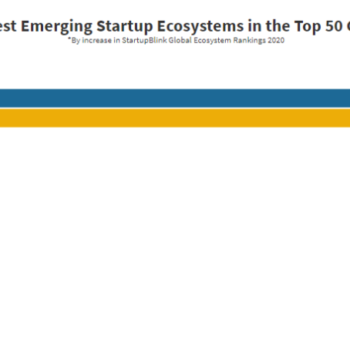Click here to view StartupBlink Accelerators’ map
Introduction
The hype around startup accelerators is hard to ignore. Every entrepreneur probably has friends, or friends of friends, who’ve been through an accelerator program and vouch for the experience. Its likely you’ve seen the terms yourself: Three intensive months of mentorship, networking opportunities, events, interaction with other founders, seed investment and shared office space. All this in return for 6-12% of equity. What’s not to like?
We spoke to Rob Walling, founder of Micropreneur Academy and Drip, and he gave us some insights into the factors startups should consider to find out if they are a good fit for accelerators programs. It turns out that when you examine the long-term goals for your startup and your own motivations for joining a startup accelerator, you may find some discrepancies. While startup accelerators are an important component of every startup ecosystem, they may not be the right choice for your startup.
In this article, we will discuss all aspects of joining a startup accelerator, so startups can make an informed choice:
- Is your startup a good fit for accelerator programs?
- Should you only join a top tier accelerator?
- What factors should you look at before joining an accelerator program?
Is your startup a good fit for accelerator programs?
Every startup is faced with this choice in its early stages. The answer varies for each startup, depending on your long-term vision for your company.
If you find yourself nodding in agreement to the points mentioned below, a startup accelerator is in all likelihood, a good choice for your startup:
-
Your goal is to build a multi-billion dollar company:
We asked Rob when would be a good time for a startup to join an accelerator program, and he said the question wasn’t “when”; it was whether your end goals align with that of the accelerator. He says, “Most accelerators want to invest in companies that are going to be worth more than tens of millions, if not hundreds. They expect you raise a Series A, Series B and have a large exit. If that is your goal, then an accelerator is a good choice. However, if you just want to build a business, that will get generate revenue and income, and don’t want to build a huge team and have a large exit, bootstrapping is a good option.”
Accelerators are backed by venture capitalists. Naturally, they look to invest in unicorns; companies that will be worth billions of dollars and have a massive exit. But what if that isn’t your goal? Rob says it can have an adverse effect on your startup, “If your goals are not in line with anyone giving you money, they can do more damage than good. Let’s say your goal is to build a SaaS business, that can generate 40-50K a month. An accelerator can fill your head with grand ideas, such as building a two-sided marketplace a mobile app, that could turn it into a 100M dollar company. They’ll try to push you into the dream of Uberisation of the world. That’s the goal.”
-
You need the education
As a first-time entrepreneur, there are several things you wish you knew before you did them all wrong. While experience is the best teacher, it’s great to learn from mavericks who’ve been there, done that. The biggest draw of a startup accelerator is quality mentorship. An accelerator will help you get feedback from its network of investors, entrepreneurs and founders. Moreover, you it will help you gain clarity on various aspects of your business such as product market fit, achieving growth, employing better processes and marketing the business.
Rob advises entrepreneurs to go for accelerators if they think they need the education and build confidence, “I think having a cohort of people going through what you are is really valuable.” At this point it is important to note that entrepreneurs should do a due diligence on the accelerator itself and see whether it will provide them with the value they need. Rob agrees and encourages startups to look at the accelerator’s mentors, “I would try to look at who are the mentors are and if they have the kind of experience that I’m looking at. If there are some that are doing what I was doing, there is a lot more value.”
-
You are looking to raise investment
As mentioned earlier, accelerators are a great fit for those startups that looking to raise several rounds of investment once they graduate from the program. Raising money is not only something accelerators help startups get ready for, but also expect them to do. An accelerator will help you get connected with investors and work on your business such that it comes becomes easy for you to raise money. It will prepare you for common investor questions such as the target audience, traction, growth and revenue model.
-
You are okay with giving up a piece of your company
Most accelerators take between 6-12% of your company. Are you willing to part with that much equity? Remember, that while an accelerator program experience can be an incredibly fruitful, the investment made by an accelerator will not last you more than six months. If raising seed investment is your major goal, an accelerator may not be the best option. Of course, there are other intangible benefits that an accelerator offers that will last you as long as the company lives, such as the mentor and investor network you build and the association with the accelerator.
Are we trying to dissuade you from joining an accelerator? Not at all. Accelerators have their place in a startup’s journey, and can enhance the business in several ways. But this is true only if an accelerator’s goals are aligned with that of the startup. If you think this is true for you, by all means you should apply to one.
In fact, Rob advises startups that want to go big to join an accelerator as early as possible, “Most accelerators pay the same amount of money to all entrants, so it’s doesn’t matter if you have a bunch of traction. You give up the same amount of equity for the same amount of cash.”
Should you only join a top tier accelerator?
Rob compares joining an accelerator program to joining a business school. Think of the difference it would make to your career if you graduated from one of the top MBA programs such as Yale, Harvard or Princeton, as opposed to graduating from a relatively unknown local college. Not that one is better than the other, but they both have certain unique advantages to offer.
Having the seal of Y Combinator or TechStars can open more doors for your startup, as opposed to smaller accelerators. It will help you differentiate yourself from hundreds of startups out there when it comes to hiring employees, meeting investors and dealing with other companies. Similarly, you will get exposed to vast network of mentors, investors and alumni. This network will help you overcome challenges even after you leave the program, and thus is invaluable.
Smaller, local accelerators, on the other hand, may not offer the same brand recognition. All the same, they can provide entrepreneurs with the education and confidence they need to proceed. If you’re joining an accelerator mainly to gain exposure to the different aspects of business and get feedback on your project, a smaller accelerator is also a good choice. But as we’ve mentioned before, take a good look at the mentors and be sure they have the experience you need.
What factors should you look at before joining a startup accelerator?
Everyone wants to join Y Combinator, Techstars and 500 Startups. For all the reasons mentioned above, top tier accelerators such as these are every entrepreneur’s first choice. But the dismal acceptance rates of 1-3% show that not every one of those startups is going to make it. There are many other accelerators to choose from though. And herein lies the catch. What factors should you consider?
First off, it is important to look at the terms on offer. Rob points to Y Combinator term sheets as a good benchmark to compare with, as they publish their term sheets online. “If an accelerator is doing the right thing they should be similar terms as all the other ones. If an accelerator wanted 15% of my company, that sounds like a lot. That’s not what the market is. There’s accelerators asking startups to pay and that doesn’t make any sense.” Remember, the more equity you give up, the more difficult it will become to raise future rounds of investment. It is essential to be in the know about terms most accelerators offer and make an informed choice.
Next, you should talk to as many alumni startups as possible before you zero in on an accelerator. Did they have a pleasant experience at the accelerator? Was the advice provided actionable? How is their startup faring today? Are the mentors committed to helping the startups grow? These are questions no one can answer better than the alumni of the accelerator.
We hope that this article has shed some light on whether your startup is ideal for an accelerator program and if you should put in the effort to get into an accelerator program.
Also, we want to make our readers aware of an opportunity to join StartupBlink’s accelerator program. City Partnership was designed to organizations that are leading local startup ecosystems. The partnership is exclusive to one organization per city, hence, we can ensure that our City Partners will receive acknowledgment as a local ecosystem leader and visibility in front of 75,000+ entrepreneurs and decision-makers on the StartupBlink Global Startup Map, as well as in our reports and communities. You can get more information and apply to the program here.
We’d like to thank Rob Walling (@robwalling), founder of Micropreneur Academy and Drip, for sharing his insights on accelerator programs with us.






